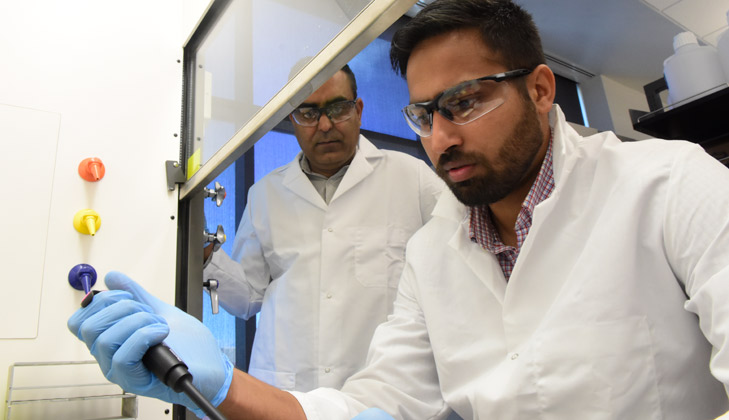Plant science graduate Hardeep Singh hails from the Indian village of Dalieawali, and even though it is over 7,770 miles away from the Central Valley, it faces similar agricultural issues like water scarcity and increased soil and water salinity.
Those issues were at the core of initial research that led him to Fresno State to pursue his master’s degree, but external factors forced him to shift to a new project that used smart LED lights to stimulate vegetative growth in citrus nursery plants.
Faculty were so impressed by his promising results and ability to switch focus that he was awarded the Dean’s Graduate Medalist, the highest honor for a student in the Jordan College of Agricultural Sciences and Technology.
“Our research showed we can potentially increase the development of young trees before they are planted in the spring,” Singh said. “We were able to fine-tune the LED wavelengths to simulate sunlight and account for the relative humidity and temperature in our growth chambers. The main goal was to lengthen their growing patterns when normally they would be decreasing in the fall because of the limited hours of natural sunlight.”
Singh will submit his findings to two research publications and has made oral presentations at professional conferences in Fresno and Las Vegas.
He worked on the study under plant science faculty Dr. Gurreet Brar, who is originally from Muktsar, India, located 60 miles from Singh’s home village, and who joined the faculty in 2016.
Both received their undergraduate degrees from Punjab Agricultural University in Ludhiana. The country’s renowned agricultural institution is also tied to Fresno State through an agreement of collaboration signed in November 2019 to exchange resources and expertise.
“I am lucky to have the chance to work with Dr. Brar,” Singh said. “He has a really wide area of expertise, and I wouldn’t have learned what I have anywhere else. It’s amazing to have such close access to all these orchards and nursery on our campus farm and to our labs.”
The partnership has also introduced Singh to other research that Brar conducts with students to target issues in many of the most profitable commodities in the nation’s leading agricultural area.
“I had never seen up close how almonds, nut or citrus crops are grown,” Singh said. “Where I’m from, we often have small-scale monoculture farming focused on rice and wheat, so the diversity here was a great chance to learn.”
He said the local Indian campus community and Sikh community have also made him feel at home, as have local cricket and soccer tournaments and the warm summer weather.
The first-generation college graduate will now likely set his sights on a doctoral degree. That research could include a return to his initial themes of sustainability and addressing drought and salinity issues that affect many parts of the world.
In the meantime, his family can take extra pride in the added degree for the first-generation college graduate, especially since his home district of Mansa has the lowest literacy rate among the 22 Punjab districts.
“I started working in agriculture at an early age with my father,” Singh said, “so I’ve had a lifelong connection. My parents encouraged me to focus on my education at an early age, so the Dean’s Medalist honor is a special reward for all their sacrifices.”





